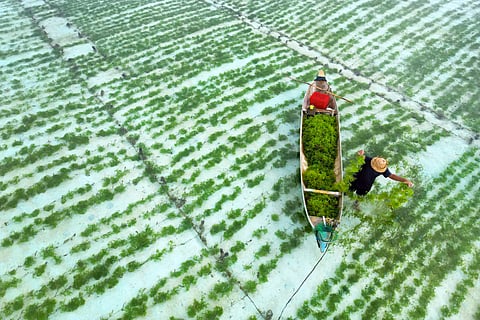

A seaweed farm in Indonesia, one of the founding member states of UNGSI, together with Madagascar and France.
Photo: Michel Arnault / Adobe Stock.
A new global platform focused on sustainable seaweed development was unveiled last week at the UN Headquarters in New York, during the UN's 80th General Assembly. The United Nations Global Seaweed Initiative (UNGSI) will bring together states, international agencies, researchers, and industry to promote seaweed’s potential in climate, environment, and livelihoods.
Speakers at the launch event noted that over the past two decades the global seaweed sector has tripled in size, reaching more than 35 million tonnes of production in wet weight. According to UNCTAD, today seaweed accounts for around half of marine aquaculture production by volume, with exports valued at about US$1.2 billion.
At the launch, Madagascar’s Fisheries and Blue Economy Minister, H.E. Paubert Mahatante, emphasised the need for progress in science, policy and funding, given seaweed's "array of benefits for people and the planet," including contributing to food security, opening opportunities for economic development of coastal communities worldwide, and providing crucial ecosystem services.
Madagascar is one of the founding members of the initiative, together with France and Indonesia, whose representative described seaweed as “a catalyst for millions who depend on the sea." Chile has now also joined, with Brazil expected to confirm its participation shortly.
The initiative also involves several UN organisations as partners, including UNCTAD, FAO, the UN Industrial Development Organization (UNIDO), and the UNESCO Intergovernmental Oceanographic Commission (UNESCO-IOC), in addition to the UN Global Compact’s Global Seaweed Coalition.
UNCTAD’s Chantal Line Carpentier called the initiative “a new chapter in the UN’s work – bringing seaweed front and centre in global frameworks on sustainability, climate, and trade, and in doing so, advancing the SDGs, particularly through more sustainable food systems and inclusive development.”
At the launch, UNIDO stressed the importance of private sector innovation backed by public support, while the UN Global Compact urged a sustainable approach to avoid mistakes made in terrestrial agriculture, such as over-reliance on monocultures.
The Global Seaweed Coalition also pledged to mobilise its international community to advance funding, research, advocacy and policy development.
The event also confirmed that UNGSI will also play a role in implementing the UN BBNJ Agreement (sometimes referred to as the "High Seas Treaty", which is due to enter into force in January 2026. Under this framework, the initiative will provide scientific advice and capacity-building to ensure the sustainable use of seaweed species found in international waters.
With its focus on climate action and sustainable development, the initiative also aims to build momentum ahead of COP30 in Brazil, the partners indicated.
